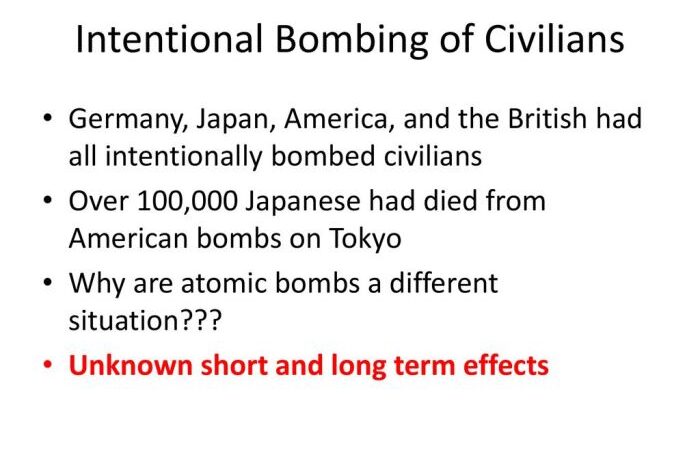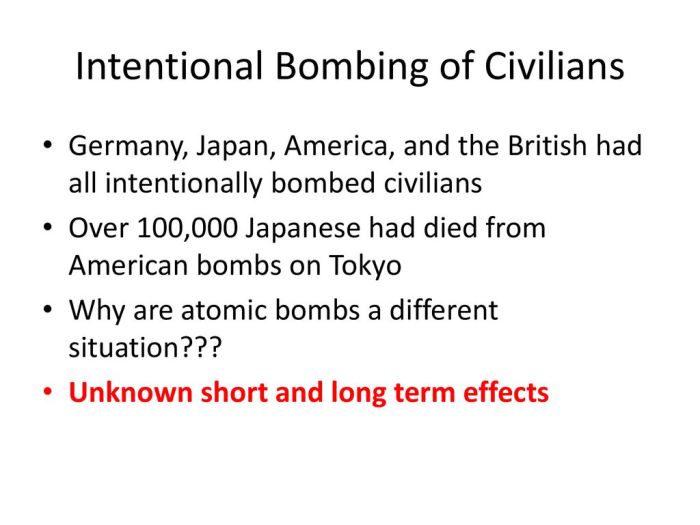
Bombing: Often Backfiring, Not Meeting Goals
Bombing has been opposite to the stated goals, a recurring theme throughout history. Despite the intent to achieve swift and decisive victories, bombing campaigns often fall short, leaving behind a trail of unintended consequences. From the devastating firebombing of Dresden during World War II to the ongoing conflicts in the Middle East, the history of warfare is littered with examples of bombing campaigns that failed to meet their objectives, instead exacerbating tensions and leaving lasting scars on societies.
This article delves into the complexities of bombing campaigns, exploring their historical context, political and social consequences, strategic considerations, ethical implications, and potential alternative strategies. By examining the successes and failures of bombing campaigns, we can gain a deeper understanding of the complexities of warfare and the unintended consequences of military force.
Historical Examples

Throughout history, numerous bombing campaigns have been launched with specific objectives in mind. However, the actual outcomes often deviated significantly from the stated goals, highlighting the complexities and unintended consequences of aerial warfare. This section explores several historical examples, examining the intended goals, the actual outcomes, and the methods employed.
It’s unsettling how often bombing campaigns, intended to achieve peace and stability, actually exacerbate conflict and sow the seeds of future violence. Noam Chomsky’s insightful analysis in chomsky the world after sept 11 highlights how the post-9/11 “war on terror” has backfired, creating a breeding ground for extremism and instability.
This pattern of unintended consequences, unfortunately, is all too common in the history of warfare, leaving us with a legacy of suffering and a future shrouded in uncertainty.
The Bombing of Dresden
The Allied bombing of Dresden in February 1945 remains a controversial event. The primary goal of the campaign was to cripple German industrial capacity and disrupt transportation networks. However, the city was largely devoid of military targets, and the bombing resulted in the deaths of tens of thousands of civilians.
The firestorm created by the bombing, fueled by the city’s wooden buildings, spread rapidly, trapping and incinerating many residents. While the campaign may have had a limited impact on German war production, it ultimately served as a symbol of the indiscriminate nature of aerial bombardment and the immense human cost of war.
The idea that bombing achieves peace is a fallacy, as history consistently shows that violence begets more violence. It’s disheartening to see this pattern repeat itself, especially when it’s coupled with attempts to silence dissent by shredding the First Amendment , further hindering any chance for meaningful dialogue and change.
The tragic reality is that bombing often creates more problems than it solves, perpetuating a cycle of conflict and suffering.
The Vietnam War
The United States’ bombing campaign in Vietnam, conducted from 1965 to 1973, aimed to weaken the North Vietnamese military and support the South Vietnamese government. The bombing campaign, known as Operation Rolling Thunder, employed a variety of tactics, including strategic bombing of military and industrial targets, as well as carpet bombing of suspected Viet Cong strongholds.
It’s disheartening to see how bombing, often presented as a solution, has consistently yielded results contrary to the stated goals. This begs the question: are we truly engaging in conflict for the right reasons, or are we caught up in a the prop agenda at war that prioritizes the advancement of certain interests over genuine peace and stability?
The evidence suggests that bombing rarely achieves its intended outcomes, leaving behind a trail of devastation and exacerbating the very problems it aims to solve.
However, the bombing campaign failed to achieve its objectives. The North Vietnamese remained resilient, and the bombing campaign only served to escalate the conflict and further alienate the Vietnamese population. The bombing campaign also had a significant impact on the Vietnamese environment, leading to widespread deforestation and pollution.
The First Gulf War, Bombing has been opposite to the stated goals
The United States-led coalition’s bombing campaign against Iraq in 1991, known as Operation Desert Storm, aimed to liberate Kuwait and cripple Iraq’s military capabilities. The campaign employed a sophisticated combination of airpower, including precision-guided munitions and stealth aircraft, targeting Iraqi military infrastructure and communication networks.
While the campaign successfully achieved its military objectives, it also had unintended consequences. The bombing campaign caused significant environmental damage, including oil spills and the release of toxic chemicals. The long-term impact of the bombing campaign on Iraqi infrastructure and the environment remains a matter of debate.
Political and Social Consequences: Bombing Has Been Opposite To The Stated Goals

Bombing campaigns that fail to meet their stated goals often have devastating political and social consequences. These campaigns can lead to the loss of innocent lives, the destruction of infrastructure, and the exacerbation of existing conflicts. Furthermore, they can undermine trust in governments and international institutions, and contribute to the rise of extremism and instability.
Impact on Civilian Populations
The impact of failed bombing campaigns on civilian populations can be catastrophic. Bombings often result in the deaths of innocent civilians, including women and children. They also cause widespread displacement, as people flee their homes to escape the violence. This can lead to overcrowding in refugee camps, which can in turn create health problems and social unrest.
The destruction of infrastructure, such as schools, hospitals, and water treatment plants, can also have a devastating impact on civilian populations, particularly in the long term.
Long-Term Effects on Targeted Regions
The long-term effects of failed bombing campaigns on targeted regions can be profound. They can lead to the destruction of economies, the weakening of social structures, and the rise of instability and conflict. The destruction of infrastructure can make it difficult to rebuild economies and provide basic services to populations.
The loss of life and displacement of people can also lead to social fragmentation and the rise of extremism. Furthermore, failed bombing campaigns can undermine trust in governments and international institutions, making it difficult to achieve lasting peace and stability.
Unintended Consequences of Bombing Campaigns
Bombing campaigns can have unintended consequences, such as the creation of new enemies or the exacerbation of existing conflicts. For example, bombing campaigns can alienate populations and create resentment against the bombing forces. This can lead to the rise of resistance movements, which can further destabilize the region and prolong the conflict.
Bombing campaigns can also inadvertently target civilians, leading to civilian casualties and the creation of new enemies. This can also undermine the legitimacy of the bombing forces and make it difficult to achieve lasting peace.
Ethical Implications
Bombing campaigns that fail to achieve their intended goals raise profound ethical concerns, prompting a critical examination of the moral dilemmas inherent in warfare. These campaigns often result in unintended consequences, including civilian casualties, long-term psychological effects, and a perpetuation of violence, creating a complex web of ethical challenges.
The Moral Dilemma of Unintended Consequences
The ethical implications of bombing campaigns that fail to achieve their stated goals are deeply intertwined with the concept of unintended consequences. These campaigns, often aimed at strategic targets, can have a ripple effect, impacting innocent civilians and exacerbating existing conflicts.
The moral dilemma lies in the tension between achieving military objectives and minimizing harm to non-combatants. This tension is amplified when campaigns fail to achieve their intended goals, leaving a trail of destruction and suffering without a clear path to resolution.
Civilian Casualties and the Principle of Proportionality
A fundamental principle of international humanitarian law is the principle of proportionality, which dictates that military action must be proportionate to the military advantage sought. This principle seeks to minimize harm to civilians and non-military objectives. However, bombing campaigns that fail to achieve their objectives often result in a disproportionate number of civilian casualties.
The indiscriminate nature of aerial bombardment, coupled with the difficulty of accurately targeting military objectives in complex urban environments, can lead to widespread civilian deaths and injuries. This raises serious ethical questions about the legitimacy of such campaigns, particularly when the military advantage gained is minimal or nonexistent.
Long-Term Psychological Effects of Bombing
The psychological effects of bombing campaigns can be devastating and long-lasting. The trauma of witnessing or experiencing aerial bombardment can have a profound impact on individuals and communities, leading to post-traumatic stress disorder, anxiety, depression, and other mental health issues.
The destruction of homes, infrastructure, and cultural landmarks can also contribute to a sense of displacement, alienation, and loss of identity. The long-term psychological effects of bombing campaigns, particularly when they fail to achieve their stated goals, can have a significant impact on the social fabric of affected communities, creating lasting divisions and perpetuating cycles of violence.






